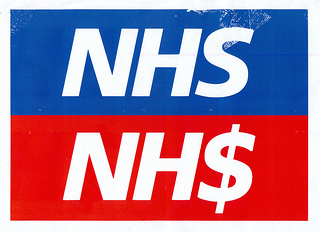 The significant financial pressure that will strain the English NHS for the foreseeable future makes avoidance of waste essential. Since the 1980s market reforms have been advanced as a means by which to curb waste, but Calum Paton finds that market policies have incurred huge direct and opportunity costs while arguably damaging the service provided.
The significant financial pressure that will strain the English NHS for the foreseeable future makes avoidance of waste essential. Since the 1980s market reforms have been advanced as a means by which to curb waste, but Calum Paton finds that market policies have incurred huge direct and opportunity costs while arguably damaging the service provided.
Do the questionable benefits outweigh the costs of market reform in the English NHS? Market reform is not new: the most recent changers were embodied in the Health and Social Care Act of 2012 but it was preceded by New Labour’s market reforms and the Thatcher-initiated ‘internal market’ before that. In a new analysis for the Centre for Health and the Public Interest, I have concluded that market reform incurs huge direct cost, both recurring and non-recurring, but also a very high ‘opportunity cost’ in terms of alternative uses for the money such as direct patient care or clinical re-design. Furthermore, it arguably causes real harm to services.
Extreme financial pressure upon the English NHS for the foreseeable future makes avoidance of waste imperative, yet the marketisation of the NHS is a major source of waste. Not only has evidence to justify these market reforms to the English NHS from 1990 to the present-day been absent, but the recent Health and Social Care Act of 2012 actually ignores, or even inverts, evidence. It has been argued that the only way that hospitals and other service providers can be reimbursed in a timely manner for their workload, and given the incentive to increase workload and productivity, is through the operation of market forces. This is simply untrue and based on a re-writing of history. It is difficult to avoid the conclusion is that market policy is based upon ideological dogma, pressure from commercial interests or both.

The recurrent annual costs of the market can be estimated (conservatively) at £4.5 billion. The one-off, start-up costs of the various phases of the market (1991-97; 2001-2007; 2010 to date) have run into billions of pounds. Conservative estimates of the most recent market initiatives under New Labour and then the Coalition government comprise £3 billion each. Official estimates, when they are made at all, significantly underestimate cost. My analysis sets out the components of the market’s high costs – both ‘start-up’ and ‘annually recurring’ – and also sets out how the wider costs of the market have included both opportunities foregone and likely harm to the system. The latter is exemplified by reference to a case study of how local health economies suffer from centrifugal forces without ‘hard’ collaboration or integration, and how ‘beggar-my-neighbour’ behaviour by individual ‘market’ agencies in the context of the NHS can damage services.
Possible benefits from the market are hotly contested in the research community. These consist primarily in controversial statistical studies which attribute a small amount of benefit to one aspect of New Labour’s ‘market’ after 2006. There is no plausible causal mechanism based on qualitative research to substantiate their argument. Yet even if one grants all the benefits claimed by supporters of the market, these are very small when set against the costs. Bluntly, saving lives this way is a bad deal in terms of cost-benefit but the alternative scenario, whereby direct investment in better services is used to achieve the same and more, is never discussed by market enthusiasts.
Astonishingly, however, policy makers across the main parties and much of the wider political spectrum have suggested that the answer to the failure of the market so far is more market. Unfortunately designing and implementing ‘market reform’ as conceptualised by economists, without consideration of the real world of healthcare reform, will always incur cost beyond benefit. In 2014, as the Health and Social Care Act is implemented, we are seeing the re-invention of expensive agencies under different names supposedly abolished, alongside the costly complexity of the new, often overlapping, agencies created by the latest market reforms. One may add to that the opportunity cost of a senior GPs time when the government is seeking a major role for GPs in providing services at weekends and in the evenings and ensuring care in the community to reduce the use of hospital beds. Indeed the transactions costs of the market – and the related opportunity cost of clinical, managerial and leadership time – is a constant presence of rising salience in the three main phases of NHS marketisation in England to date.
The analysis concludes by sketching how it is possible to have patient choice without the market. Policy-makers have confused more sensitive referral and case-management by GPs with market-place commissioning. The market has tended to be opposed to true patient choice, as commissioning through contracting has supplanted genuine patient and GP autonomy. First ‘purchasing’ and then ‘commissioning’ has been the dog that did not bark over the last twenty-five years – not because we do not need strategic service planning, but because it has been confused with playing at markets.
Note: This article gives the views of the author, and not the position of the British Politics and Policy blog, nor of the London School of Economics. Please read our comments policy before posting.
About the Author
 Calum Paton is now Professor of Public Policy at Keele University, where he has been Professor of Health Policy since 1993. He has written many books and articles on politics and health policy, and has researched ‘reforms’ to the UK (later, English) NHS since the late 1980s. He has also led EU research projects on health system reform and researched US health policy. He has been a witness to the House of Commons Select Committee on Health and to the Francis Public Inquiry. He was Chair of the University Hospital of North Staffordshire NHS Trust from 2000-2006. At Keele, he is the long-serving Director of the MBA Health Executive programme.
Calum Paton is now Professor of Public Policy at Keele University, where he has been Professor of Health Policy since 1993. He has written many books and articles on politics and health policy, and has researched ‘reforms’ to the UK (later, English) NHS since the late 1980s. He has also led EU research projects on health system reform and researched US health policy. He has been a witness to the House of Commons Select Committee on Health and to the Francis Public Inquiry. He was Chair of the University Hospital of North Staffordshire NHS Trust from 2000-2006. At Keele, he is the long-serving Director of the MBA Health Executive programme.






Well done for exposing the elephant in the room with clear language.
This argument is not just a UK issue but has international importance.
http://www.nejm.org/doi/full/10.1056/NEJMp1408009#t=comments
You’re right to suggest that there is little evidence for the benefits of market reforms, but there is also a lack of evidence for a monopoly provider. Analysis that looks at % GDP spent on healthcare against outcomes is interesting, but tends to miss out contexts. For example, a common finding is that the UK spends by far the least in the developed world, but gets good outcomes – often better than those who spend more.
I am quite skeptical of markets in healthcare. Not least the agency/flawed consumer problem. For example, you often hear of patients in America undergoing fairly invasive procedures – not because they need it, but because they’ve been advised to so the doctor can make a claim on the insurance. But for the UK context, there was some interesting work from Carol Propper and colleagues a few years ago that seemed to advocate fixed price competition (if my reading is correct…), and similar work from Zack Cooper showed poor outcomes for price competition. This seems to suggest that fixed rate competition leads to better outcomes, and that price competition leads to a race to the bottom.
Interestingly, some of the points made in this post can be seen in how CCGs have developed. They was supposed to be many more CCGs than are now, but having excessive transaction costs and other costs associated with more ‘buyers’ meant the final number of CCGs was quite similar to the amount of PCTs.
If the current reforms are given a long run (I suspect they won’t if Labour win the next election) we shall know a lot more. I do suspect, however, that there will increases in private sector cream skimming/cherry picking – or in other words, private sector treating patients that they can make a profit on. Why would any private enterprise undergo a course of action where they can’t make a profit? This may mean the NHS is burdened with only costly patients – possibly leading to sustainability issues.
And then there’s patient choice, some of the issues of which are discussed here (and in the excellent papers on the ref list!) – http://www.hindawi.com/journals/isrn.family.medicine/2014/742676/